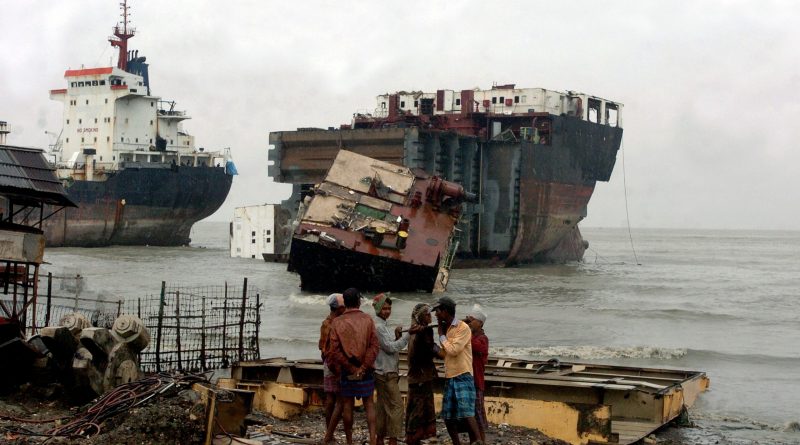Introduction
In the bustling shipbreaking yards of Bangladesh, where decommissioned vessels meet their final fate, a grim reality unfolds. Here, amid the clanking of metal and the roar of blowtorches, human lives hang in the balance, often sacrificed at the altar of profit. This report delves into the harrowing accounts of workers like Rakib, whose lives have been irrevocably altered by the perilous conditions prevailing in this industry.
Rakib’s Tragedy: A Grim Reality
Rakib’s story epitomizes the perils faced by shipbreaking workers in Bangladesh. Amid the ruins of a ship, his leg severed and his abdomen pierced, he lay for nearly an hour before rescue arrived. The arduous journey to the hospital, the denial of treatment due to the severity of his injuries, and the subsequent neglect by the shipyard owners paint a bleak picture of exploitation and indifference.
Human Rights Watch Report: Unveiling the Truth
The Human Rights Watch (HRW) report, released in collaboration with the Shipbreaking Platform, sheds light on the alarming practices rampant in the shipbreaking industry. It reveals that over 80% of vessels from European, Eastern, and Southeast Asian companies meet their end on the shores of Bangladesh, India, and Pakistan, evading international regulations and endangering both the environment and workers.
The Profitable Yet Deadly Industry
Despite its lethal repercussions, shipbreaking remains a lucrative business for Bangladesh, injecting billions of dollars into the economy. However, this economic boon comes at a steep human cost, with workers toiling under hazardous conditions for meager wages. The testimonies collected by HRW underscore the widespread exploitation and disregard for basic safety measures.
Evasion of International Regulations
One of the primary concerns highlighted in the report is the blatant circumvention of international regulations by shipowners. By reflagging vessels to non-EU countries and exploiting loopholes in existing laws, they sidestep accountability and perpetuate a cycle of exploitation. The EU’s Ship Recycling Regulation (SRR) and Waste Shipment Regulation (EUWSR) are routinely flouted, allowing for the unchecked flow of hazardous materials to developing nations.
The Plight of the Workers: A Tragic Reality
For the workers on the frontlines, the shipbreaking yards represent a perilous battleground where every day brings the risk of injury or death. Lacking proper safety equipment and subjected to grueling labor, they navigate a treacherous environment with little recourse for protection. The prevalence of child labor further exacerbates the humanitarian crisis, with minors comprising a significant portion of the workforce.
Exploitation and Neglect: A Systemic Failure
The accounts of workers like Aarul and Sohrab underscore the systemic failures that perpetuate exploitation and neglect in the shipbreaking industry. Despite the inherent risks, they are forced to endure precarious conditions to make ends meet, with little hope for redress or justice. The absence of regulatory oversight and accountability emboldens shipyard owners to prioritize profits over human lives.
International Complicity: Holding Stakeholders Accountable
The complicity of international stakeholders, including shipowners and regulatory bodies, cannot be overlooked in perpetuating the injustices inherent in the shipbreaking industry. By turning a blind eye to the plight of workers and prioritizing financial interests, they are complicit in perpetuating a cycle of exploitation and suffering.
Calls for Action: Towards a More Sustainable Future
In light of the findings presented in the HRW report, urgent action is needed to address the systemic injustices plaguing the shipbreaking industry. From stringent enforcement of existing regulations to greater transparency and accountability from stakeholders, concerted efforts are required to ensure the safety and well-being of shipbreaking workers and mitigate the environmental impact of this inherently hazardous practice.
Conclusion
The shipbreaking industry in Bangladesh stands as a stark reminder of the human cost of unchecked capitalism and corporate greed. As Rakib’s story and the testimonies of countless others attest, behind every scrapped vessel lies a tale of exploitation, neglect, and untold suffering. It is incumbent upon governments, regulatory bodies, and industry stakeholders to heed the calls for justice and enact meaningful change to prevent further loss of life and preserve the dignity of those who labor in the shadows of our global economy.

